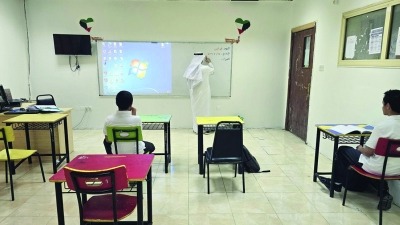
• While some school administrations appear lax in addressing the issue of absenteeism, former Ministry of Education psychological consultant Huda Al-Haddad described the issue as a ‘negative phenomenon.’
Several Ministry of Education schools reported high absenteeism rates during Ramadan, particularly on the Thursday before the holiday, according to reports published in the Al Rai newspaper.
This recurring trend, observed by the ministry before and after religious and national holidays, has intensified during Ramadan. Absenteeism started at varying levels in the early days of the holy month and gradually increased, leaving many classrooms nearly empty of students.

While some school administrations appear lax in addressing the issue—or even in enforcing absence regulations and grade deductions—former Ministry of Education psychological consultant Huda Al-Haddad described absenteeism as a “negative phenomenon.” She attributed its primary cause to a lack of discipline within families, emphasizing that heads of households bear full responsibility and have no excuse, especially after receiving absence notifications via the Sahel app.
Al-Haddad highlighted that the Ministry of Education’s measures are effective in tackling absenteeism. These include deducting half a grade from each subject for students who miss three days without an excuse and expelling students if their unexcused absences reach 15 days. She noted, however, that some school administrations may be lax in enforcing these policies and stressed the need for accountability among non-compliant schools.
She described the ministry’s approach as ‘decisive’ in deterring absenteeism, particularly in countering students’ attempts to coordinate mass absences through social media to evade punishment. She also pointed out that deducting half a grade per subject has a significant impact on a student’s GPA, especially in high school, where grades are cumulative.
Al-Haddad stressed the importance of students taking responsibility for their education, emphasizing that it is their key to the future. She noted that regular school attendance helps prevent the negative consequences of absenteeism, particularly poor academic performance and gaps in learning.
Notably, the Ministry of Education previously launched an electronic absence tracking system on its official website, enabling parents to monitor their children’s attendance both within and outside the country. By using the student’s or guardian’s civil ID number and password, parents can access comprehensive student data, including daily absences, behavior reports, pledge letters, summons, expulsion records, student evaluations, class schedules, and sick leave. This system ensures parents remain informed and engaged with their child’s education at all times.













